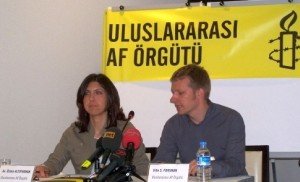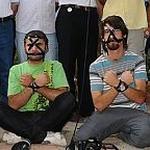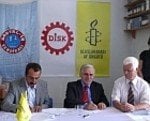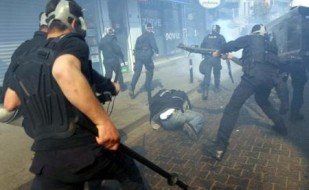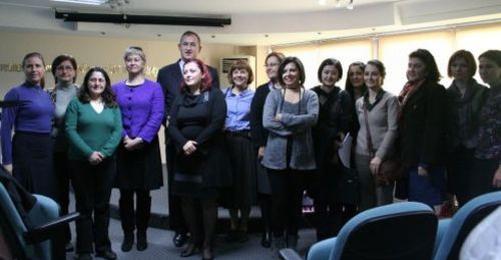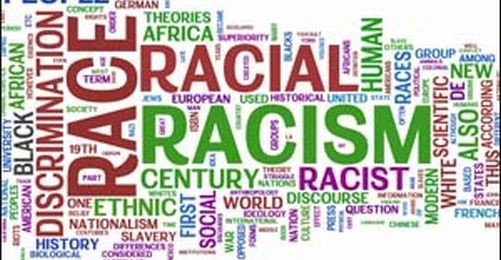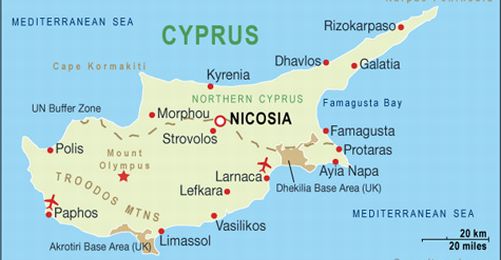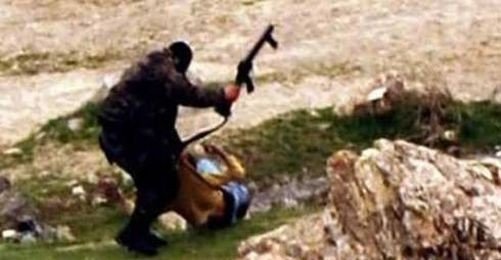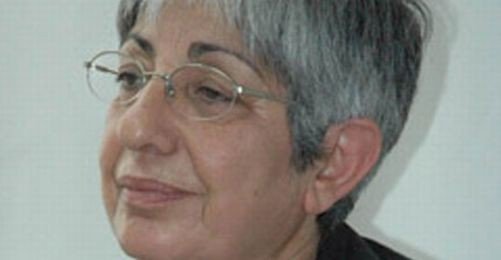Amnesty International presented its 2008 report on human rights. The report states that “In the wake of increased political uncertainty and army interventions, nationalist sentiment and violence increased. Freedom of expression continued to be restricted. Allegations of torture and other ill-treatment and the use of excessive force by law enforcement officials persisted. Prosecutions for violations of human rights were ineffective and insufficient, and fair trial concerns persisted. The rights of refugees and asylum-seekers were violated. There was little progress in providing shelters for victims of domestic violence”.
Özlem Altıparmak, a lawyer and the president of the Turkish branch of Amnesty International (UAÖ), and Ville S. Forsman, the branch director, presented the report at the press conference in Taksim Eresin Hotel yesterday, the same time with the rest of the world.
Stating that the lack of punishment in injustice, inequality and human rights violations prevailed everywhere around the world, Altıparmak says that at the 60th anniversary of the Universal Declaration of Human Rights, all the governments should apologize for past violations and show determination to implement these rights.
The section of the report that covers Turkey was prepared through visits the Amnesty International representatives made during the months of May, July and September. The highlights of the report, as explained by Altıparmak, are as follows:
Freedom of expression
The peaceful expression of opinion continued to be restricted in law and practice. Lawyers, journalists, human rights defenders and others were harassed, threatened, unjustly prosecuted and physically attacked. An increased number of cases were brought under Article 301 of the Penal Code, which criminalizes “denigration of Turkishness”, despite national and international opposition to the Article.
The report mentions the Malatya massacre of the three Protestants, two Turkish nationals and one German citizen, the application in an arbitrary and overly restrictive manner of Article 216 of the Penal Code, which criminalizes “inciting enmity o hatred among the population” and the prosecutions which were brought under Article 7(2) of the anti-terrorism law that criminalizes “making propaganda for a terrorist organization or for its aims.”
Human rights defenders
Human rights defenders were prosecuted for their peaceful activities. In June, three people associated with the Human Rights Association (İHD) were given prison sentences for criticizing the “return of life” prison operation by state authorities in 2000. Istanbul Governor’s office applied to the courts for the closure of the lesbian, gay, bisexual and transgender people’s organization Lambda Istanbul on the grounds that the name and objectives of the group were against “law and morals”.
Impunity
Investigations into human rights violations perpetrated by law enforcement officials remained flawed and there were insufficient prosecutions. Official human rights mechanisms remained ineffective. In June, parliament amended the Law on the Powers and Duties of the Police, giving police further powers to use lethal force by allowing them to shoot escaping suspects if they ignore a warning to stop.
Unfair trials
Fair trial concerns persisted, especially for those prosecuted under anti-terrorism laws. In protracted trials, statements allegedly extracted under torture were used as evidence.
Killings in disputed circumstances
Fatal shootings by the security forces continued to be reported, with failure to obey a warning to stop usually given as justification. However, incidents often involved a disproportionate use of force by security forces and some killings may have been extrajudicial executions. In a number of instances, investigations were compromised when evidence was lost by law enforcement officials.
Torture and other ill-treatment
Torture and other ill-treatment Allegations of torture and other ill-treatment continued, especially outside official places of detention. In June, Mustafa Kükçe died after being detained in several different police stations in Istanbul. Relatives who identified his body said that it was apparent that he had been tortured before his death. No case was brought against police officers. Lawyer Muammer Öz was allegedly beaten by police officers while drinking tea with family members in the Moda district of Istanbul. Members of the security forces continued to use excessive force when policing demonstrations. In some of the Labour Day demonstrations on 1 May in various parts of the country, police used batons and tear gas against peaceful demonstrators.
Prison conditions
Harsh and arbitrary punishments continued to be reported in “F-type” prisons. A circular published in January granting greater rights to prisoners to associate with one another remained largely unimplemented. Some prisoners were held in solitary confinement and small-group isolation.
Conscientious objectors
Conscientious objection to military service was not recognized and no civilian alternative was available.
Refugees and asylum-seekers
Refugees continued to be denied access to a fair and effective national asylum system. The Turkish authorities forcibly returned recognized refugees and asylum-seekers to countries where they were at risk of serious human rights violations, in violation of international law.
Violence against women
Laws and regulations to protect women victims of domestic violence were inadequately implemented. The number of shelters remained far below the amount stipulated under the 2004 Law on Municipalities, which required a shelter in all settlements with a population of more than 50,000.
To read the full report go to Amnesty International.
(EÜ/GG/TB)





